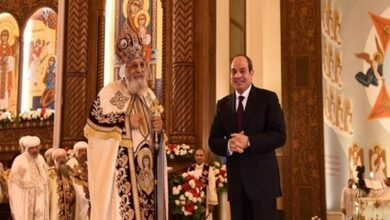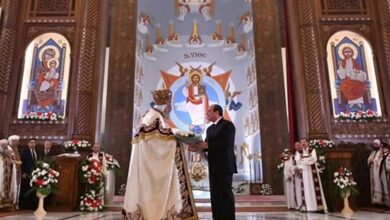On Saturday, the Coptic Orthodox Church celebrated the birth of Jesus. More than a memory, the nativity sends powerful messages that speak to our lives today. How did these messages resonate with the actions of the Church leadership? Egypt watched with a sense of betrayal as the generals, responsible for its children’s bloodshed, sat front row at the Cathedral. Her heart wept over the neglect of her sons and daughters’ memories by the religious establishment in Abbasseya. We — Christians of Egypt — are left to wrestle with Jesus’ message on his birthday. Unpacking his gift of truth, we find in it words of rebuke, wisdom and love.
First, rebuke. Many Copts defend the Church leadership’s actions by advocating forgiveness of the oppressor. They say that forgiveness is an essential part of Christianity. I wholeheartedly agree with the last statement. However, to take this truth to mean that we should bow in cowardice to the ruling Supreme Council of the Armed Forces generals would be a misguided — and dangerous — misinterpretation of the Christian message. Failure to acknowledge injustice is sharing in it, as it is written: “Woe to those who call evil good and good evil, who substitute darkness for light and light for darkness, who substitute bitter for sweet and sweet for bitter!” (Isaiah 5:20). Moreover, extending a hand of acceptance to greet a hand soaked with the blood of the innocent, a hand actively engaged in imposing systemic injustice, is a stab in the back of the nation. Surely, we are called upon to love our enemies, but do we dare love them enough to tell them they are wrong? If we do not speak out, we deprive the oppressor from knowing the evil of his ways. Since “we will all stand before the judgment seat of God” (Romans 14:10), shouldn’t we care about their standing before him? Yet, how can they be saved if they do not repent? And how can they repent unless we confront them?
It is then time to heed wisdom. The Coptic leadership may think it is protecting its people by capitulating to the authorities, but it wrong. History itself teaches us that whenever the Church stands with the people, the people will stand with the Church. The reverence with which Poland holds the Church for supporting the people’s right to freedom is only matched by the contempt the rest of Europe has for the Church, as a result of its cowardice vis-à-vis fascism and communism. Moreover, the Church’s actions or inactions can go further than betraying society, for it can betray itself and its founder who said: “I came that they may have life, and have it abundantly” (John 10:10).
The quest for wisdom, however, will be anything but smooth. Not only was the chanting of “Down, down with military rule” during the Christmas service unprecedented, it was also symbolic of growing discontent within the Coptic Church and a herald of many changes to come. In disagreeing with their leadership, believers in Christ will have to struggle with the concept of authority. Coptic Christians hold the Pope’s office, and authority in general, in high regard. Peter writes: “Submit yourselves for the Lord’s sake to every human institution” (Peter 2:13). Moreover, concerning the chief religious authority we read: “You shall not speak evil of a ruler of your people” (Acts 23:5). Does this mean that we should obey, no matter what the religious and secular authorities do? If that were true, we would not have had Christianity to begin with. Not only did Jesus consistently oppose the religious abuses of his day, but also the early disciples refused to heed the direct order of the chief priest “not to speak or teach at all in the name of Jesus” (Acts 4:18). In their disobedience, they were not contemptuous toward the concept of authority; rather they submitted to a higher rule, since God’s principles ought to be supreme.
Finally, the Prince of Peace gives the world the gift of love. Holidays can be very hard on families that lost some of their members, especially the young and innocent who died so you and I can be free. It is the church’s responsibility to comfort and heal, to deliver faithfully the Christmas message: “God is not distant and cold, He is near and He cares.” In all the mess, through all the confusion, we — the followers of Jesus — need to give this message to the hurting. We need to offer it, vulnerable and misunderstood as it is, on a cold, lonely winter night, like the child born to us two millennia ago, whispering in the ear of the widow, the orphan and the hurting: “The Lord has not forgotten you. God loves you.”
We need to hear the call: “Comfort, O comfort my people” (Isaiah 40:1).
We need to listen, even when our leaders won’t.
If believers in Jesus are one body, then the word of God is the spirit that dwells within it. Not only does the separation of spirit from body do violence to both, but it is the sure harbinger of the person’s death. May we never forget the words of our Prince of Peace. As a community of faith, our job is to follow the teachings of Christ after Him — to build, not tear down; to heal, not hurt; to uphold life, not death; to kiss the oppressed, not the oppressor's shoe.
Sherif Yacoub is a physician, born and raised in Egypt, now lives and works in the US




